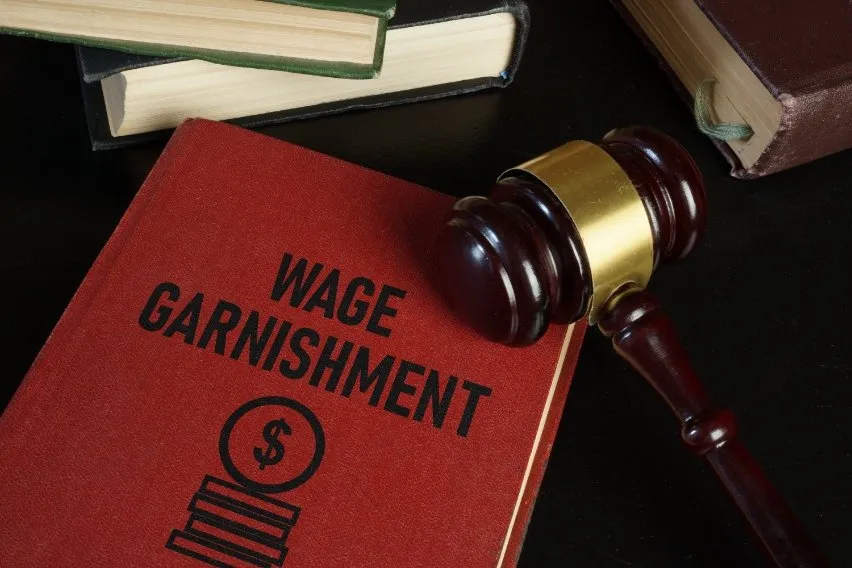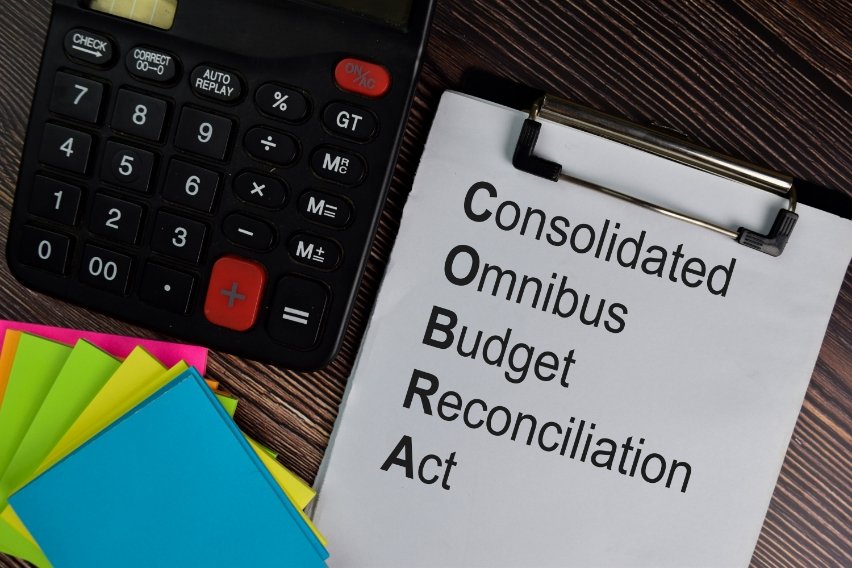Wage Garnishment: What It Is & How It Works?

U.S. households spend around 10 percent of their monthly income on consumer debt. This is typically to repay loans, credit cards, or medical bills.
Those who fail to meet their repayment obligations could be at higher risk of wage garnishment. Read on to find out what wage garnishment is, how it works and what rights you have to make legal challenges.
Table of Contents
How Much of Your Wages Can be Garnished
What Are Your Rights In a Wage Garnishment?
How to Object to a Wage Garnishment
What is Wage Garnishment?
Wage garnishment happens when there is evidence that you, the debtor, have failed to meet a debt repayment agreement.
A court can order a garnishment judgment so that your employer, the garnishee, has to withhold a certain amount of your salary.
They would then send this directly to your creditor, the person or company to whom you owe money. This would continue until you have met the condition of the order, usually by repaying the debt in full.
You will have certain legal rights to ensure the wage garnishment process gets carried out correctly. This includes a cap on how much of your salary a creditor can demand each time you get paid.

Types of Wage Garnishment
A significant proportion of employees will have their wages garnished. The most typical reasons relate to unpaid student loans, child support, consumer debts, and tax levies.
There are 2 kinds of garnishment:
- In wage garnishment, creditors could make it a legal requirement that your employer gives them a portion of your wages to settle what you owe.
- In nonwage garnishment, creditors may take funds directly from the account you hold at your bank. You might hear this kind of garnishment called a bank levy.
Do Garnishments Always Require a Court Order?
Garnishment tends to happen when the person or business you owe money to pursues you through the courts for nonpayment of a debt. Occasionally, a creditor may be able to impose a garnishment without the need for a court order. This might happen if you owe back taxes, child support, or the balance on federal student loans.
The court will issue notices to your bank, or your employer as well as yourself. The garnishment would then begin in 5 to 30 business days. This will depend on your creditor and where you live. The garnishment carries on until the debt, usually including court fees and interest, gets repaid in full.
Kinds of Income
Federal law states that income liable for wage garnishment can include:
- Regular wages or salaries
- Bonuses and commissions
- Payments from pensions and employment-based disability programs
- Lump-sum payments such as referral or sign-on bonuses
- Payments related to relocation incentives, attendance, and service awards
Some kinds of income are exempt from garnishment in certain circumstances. For instance, this might include any cash you receive from Social Security or for Unemployment Insurance. These can’t get garnished to pay off consumer debt such as loans or credit cards.
These sorts of benefits may get garnished for child support or debts owed to the federal government, however. States also have different rules around what they perceive to be exempt from garnishment.
How Much of Your Wages Can Be Garnished?
There are certain federal limits related to how much of your disposable income a creditor can take. Disposable income refers to what’s left after the required deductions like taxes and Social Security.
Most Types of Consumer Debts
This could include credit cards, personal loans, and medical bills. The rules mean that the following amounts could get garnished, whichever is less:
- Either up to 25 percent of your wages
- Or the figure by which your weekly income surpasses 30 times the federal minimum wage- currently $7,25 per hour
Let’s say your weekly disposable income is $291 or above, you would have to pay a maximum of 25 percent. When your weekly disposable income is somewhere between $289.99 and $217.51, the amount above $217.51 may be subject to garnishment.
If your weekly disposable income is $217.50 or less, there would be no garnishment permitted.
Alimony and Child Support
In these cases, up to 50 percent of your disposable wage could get garnished. That’s if you are supporting a spouse or another child, otherwise it would be up to 60 percent. If you are more than 3 months late in payments, an extra 5 percent may get taken.
Federal Student Loans
If you owe federal student loans you may get up to 15 percent of your wages garnished.
Taxes
The Internal Revenue Service (IRS) will decide the amount taken. It will base this on standard deductions and the number of dependents you may have.
State-by-State Variations
There are huge differences around garnishment between states. It’s possible that the state where you live may protect more of your income. There can be other exemptions too such as being the main breadwinner with dependent children.
You should be proactive by finding out what, if any, exemption there may be where you live. Non Wage garnishment tends to have less regulation around it. That means there are fewer restrictions that creditors would need to adhere to.
What Are Your Rights In a Wage Garnishment?
There are going to be dependencies. These include where you live, the kind of debt you owe, and what your personal circumstances are.
Wage Garnishments for Court Judgments
It could be that you failed to make a loan, medical bill, or credit card payment. Creditors cannot simply begin to garnish your salary. They would have to sue you initially. If you don’t win, the person or organization that won the lawsuit could garnish your wages.
They would need to provide a copy of the court order to the local marshal or sheriff. They would then forward it to your employer. The person who employs you must then inform you about the garnishment. They will forward the garnished money to your creditor and explain how you can challenge the garnishment.
Your employer can’t fire you because of wage garnishment. If you wish to challenge a wage garnishment, you would have to go to court and file papers to get a hearing. You could, for example, demonstrate at a hearing that you need more of your paycheck to live on. You may also believe that you qualify for an exemption.
Wage Garnishments for Child Support and Alimony
For many years now, child support orders have come with an automatic wage withholding order. When alimony and child support form a single family support payment, the order applies to the total amount owed. Orders that relate to alimony alone don’t lead to automatic wage withholding.
When there’s an order for you to pay child support, the child’s other parent or the court will send a copy of the order to your employer. They will then withhold the required amount from your paycheck and forward it to the parent concerned.
There may be a requirement for you to keep up with health insurance coverage for your child. If so, the payment for that gets deducted from your paycheck too. An employer cannot fire or discipline you over a withholding order to pay child support.
Wage Garnishments for Federal Student Loans
The U.S. Department of Education, or the agency it appoints to collect the loan repayments, can garnish up to 15 percent of your pay if you’re in default. No lawsuit or court order is necessary for this kind of garnishment.
Around 4 weeks before the garnishment is set to start, you must get a notification in writing of:
- The amount you owe
- The way you can get a copy of records relating to the loan
- How you can start a voluntary repayment schedule
- How to ask for a hearing on the proposed garnishment
Wage Garnishments for Back Taxes
The IRS can take a substantial portion of your wages without obtaining a court order first. How much you can keep will depend on the number of dependents you have and the amount of tax you should still be paying.
Your employer is likely to pay you minimally and give the balance to the IRS. The IRS has to forward a wage levy notice to your employer. They must in turn provide you with a copy. The notice comes with an exemption claim form, that you can fill in and return.
Local tax and State agencies may also have the right to take some of your wages.
How to Object to a Wage Garnishment
You should study any judgment carefully to make sure all of the information on it is accurate. It could relate to a debt you believe you have already paid off. It might not in fact be your debt at all.
If you believe the order is correct, think about what it could mean for your financial situation. There are 3 main options available to you:
Working Out a Different Deal
Reach out to your creditors. Instead of burying your head in the sand, strike up a conversation. There is almost always room for maneuver, so see if you can work out a payment plan that will suit you better.
Challenging the Judgment
You may think the garnishment is a mistake or would be likely to lead to undue harm. You might also believe there’s been an error in its execution due to a technicality. You have the right to object in court. You must act fast. It’s possible that you may only have a matter of days to challenge the ruling.
Accepting the Garnishment
Depending on what the judgment states, you may be able to pay off the garnishment in installments or as a lump sum. It might be possible to borrow from a family member or take out a personal loan to pay off the judgment. This might be the less stressful option compared to a long series of payments.
It can be uncomfortable talking about wage garnishment with employers. You should make the effort to do so as they may be able to offer help and advice.

Key Takeaways
Wage garnishments happen when you default on payments you have agreed to make. These typically relate to any kind of loan. Creditors may have to sue you to successfully force a wage garnishment.
Your employer would deduct the amount ordered from your wages and send it to your creditor.
There are different rules around the amount that can get deducted. These will depend on where you live, what the debt is for, and your personal circumstances.
There are ways to contest wage garnishments. The best way to work out a better deal is usually to talk to your creditor in the first instance.
FAQs on Wage Garnishment
Does Wage Garnishment Help Your Credit?
Wage garnishment is more likely to be detrimental to your credit report. However, it is usually a court judgment rather than the garnishment itself that has the greatest effect. Sticking to a strict future budget will help. You may also be able to take out products like a secured credit card in an effort to build back and restore your credit rating.
How Long Before a Creditor Can Garnish Wages?
If you default on a debt repayment, the creditor ought to inform you that you could face a court order to repay the debt. Creditors must follow the legal processes that result in a court issuing a wage garnishment order. If the creditor sues you successfully, your employer may have to deduct part of your salary within several days or weeks.
Can Your Bank Account be Garnished Without Notice?
The only time this can happen is if you owe money to the IRS. It would be rare for the IRS not to give you notice that this was likely to happen.
Do Garnishments Affect Your Taxes?
If your wages get garnished in order to pay off debts, you will have to pay tax on the amount garnished. For the purposes of the IRS, the amounts garnished are still taxable income and are reportable as wages on your federal income tax return.
About the author
Janet Berry-Johnson, CPA, is a freelance writer with over a decade of experience working on both the tax and audit sides of an accounting firm. She’s passionate about helping people make sense of complicated tax and accounting topics. Her work has appeared in Business Insider, Forbes, and The New York Times, and on LendingTree, Credit Karma, and Discover, among others. You can learn more about her work at jberryjohnson.com.
RELATED ARTICLES


 What Is COBRA Insurance? Process, Pros & Cons
What Is COBRA Insurance? Process, Pros & Cons Bonus Pay: Definition, Types & Tips for Earning Bonus
Bonus Pay: Definition, Types & Tips for Earning Bonus Payroll Cost: How to Calculate & Factors that Affect Payroll Cost
Payroll Cost: How to Calculate & Factors that Affect Payroll Cost How to Do Payroll Yourself for Small Business
How to Do Payroll Yourself for Small Business Payroll Accounting: Definition, Importance & Setup Process
Payroll Accounting: Definition, Importance & Setup Process What is a Payroll Card & How Do They Work?
What is a Payroll Card & How Do They Work?